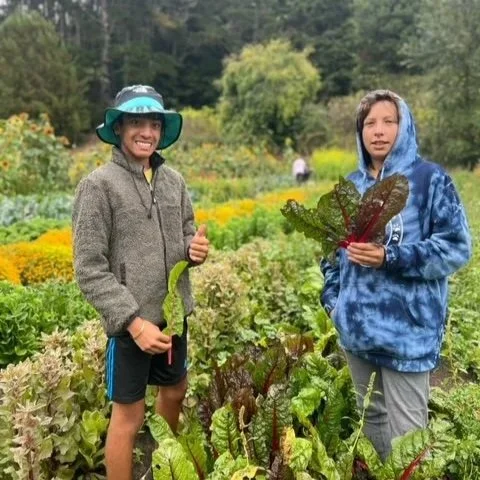What's the Buzz on Campus?
A new beehive, our school in the Marin IJ, and more.
Fostering a connection with nature and respect for the natural world is fundamental to our school’s mission and values. Through daily time outdoors, a robust gardening program, exploration in the neighboring open space, and outdoor education trips across California, students at Marin Waldorf School learn to cherish the Earth and their role as its stewards.
At Marin Waldorf School, we believe that spending time outdoors—for learning and in unstructured play—is essential to a healthy childhood. Research shows that spending time in nature during childhood is linked to a variety of benefits, from lower stress to a more robust immune system. Not surprisingly, spending time outdoors in childhood is also linked to pro-environmental attitudes in adulthood.
A Green Future at MWS
Our school’s 10-acre campus, nestled beside the Lucas Valley open space, is an essential to our identity and culture. It is home to a grassy playing field, a old-growth oak grove, several biodynamic teaching gardens, and dedicated play yards for preschool and kindergarten students.
Our gardens are beautiful and serene spaces for relaxation and play. They are also hands-on outdoor learning labs, which support the study of environmental and life sciences across the curriculum. Through activities like planting seed starts, preparing compost, pruning and weeding, and harvesting crops, students gain a practical understanding of the carbon cycle, botany, basic organic chemistry, nutrition, and more.
Learn more about how MWS’s hands-on, nature-based, and social education builds creative and engaged students.
Expanding our school’s gardening program and upgrading our teaching gardens has been a priority for our faculty and administration over several years. Led by a team of committed MWS faculty, our site committee has been busy planning a renovation and expansion of the current gardens, with the specific aim to upgrade and expand the school’s main biodynamic teaching garden, just behind the library.
In the spring of 2024, we completed the first phase of the project, installing new garden beds from recycled wood and planting “three sister” crops. This year, the site committee’s vision included the installation of a beehive to support pollination in the garden and across campus, as well as to teach basic beekeeping skills as part of our garden curriculum. In tandem, as their parting gift to the school, the Class of 2024 chipped in to clean the pond and trim back the lilies, remove worn flower beds, build six new benches, and donate a cedar picnic table to the garden.
Growing in Partnership
In addition to our active gardening program, Marin Waldorf School is committed to the responsible stewardship of our beautiful campus and its magnificent oak grove. In the spring of 2025, Marin Waldorf School began a multi-year partnership with Point Blue, a Marin-based conservation nonprofit that promotes and funds science-backed solutions to climate change.
Working alongside the Blue Point team, students and teachers from kindergarten to 8th grade are working together to plant perennial pollinators in several large patches, as well as a number of native pollinator "islands" to provide stepping stones for the insects and birds. The program also includes educational sessions with Blue Point staff and scientists.
We held our first all-school event with Point Blue in the spring of 2025 and were delighted to have our program featured in the Marin Independent Journal in October. “Projects like these don’t just help pollinators and improve soil health, they also give students a concrete sense of agency in Earth stewardship,” writes Marin IJ garden editor PJ Bremier. “By planting native species, conserving water and building habitat corridors, students learn that restoring even a small patch of land can have ripple effects far beyond the school gates.”
Introducing La Casita Abejita
As part of our work with Point Blue, handwork teacher Isabel Dow and her father, Duncan, installed a new hive of honeybees in the 3rd grade garden. We kicked off the 2025 school year by choosing a new name for the beehive with the Beehive Naming Challenge. The winning entry (selected by our faculty) was Casita Abejita (little house of the bees), submitted by the Morning Glory kindergarten.
What Is the 3rd Grade Garden?
Did you know that Marin Waldorf School has three teaching gardens? There's the kindergarten vegetable garden, the all-school biodynamic garden behind the library, and the 3rd grade garden near the music room, where the bees are now getting comfortable with their new Lucas Valley lifestyle.
Why does 3rd grade have its own garden? Because 3rd graders study gardening and agriculture as part of the wonderful practical arts curriculum, which also includes topics like cooking, carpentry, shelter-building, and time and measurements in math. Over the course of the school year, students tend to the vegetable beds and grape vines in the garden, and they learn to cook meals from scratch using food they've harvested with their own hands. (A beloved tradition for 3rd graders is stomping grapes for grape juice every fall!) They also take several farm trips, including a day trip to Slide Ranch and their first overnight field trip to Three Springs Farm, a beautiful biodynamic farm in Bodega, California.
Gardening also plays an important role in the 5th grade year, when students take up the study of botany. 5th graders spend a lot of time in our biodynamic garden, in addition to foraging and identifying plants around campus and across Marin County! Here’s some pictures from a recent 5th grade botany trip to Point Reyes.
Learn More
Read more about our partnership with Point Blue in the article “Marin school project combines education with action” from the Marin Independent Journal.
More Green Time, Less Screen Time: Learn more about how Marin Waldorf School’s screen-free classrooms and slow, thoughtful approach to tech is balanced with daily time outdoors and a robust outdoor education program.
See it for yourself! Sign up for a small group tour of campus on an upcoming Friday morning.









